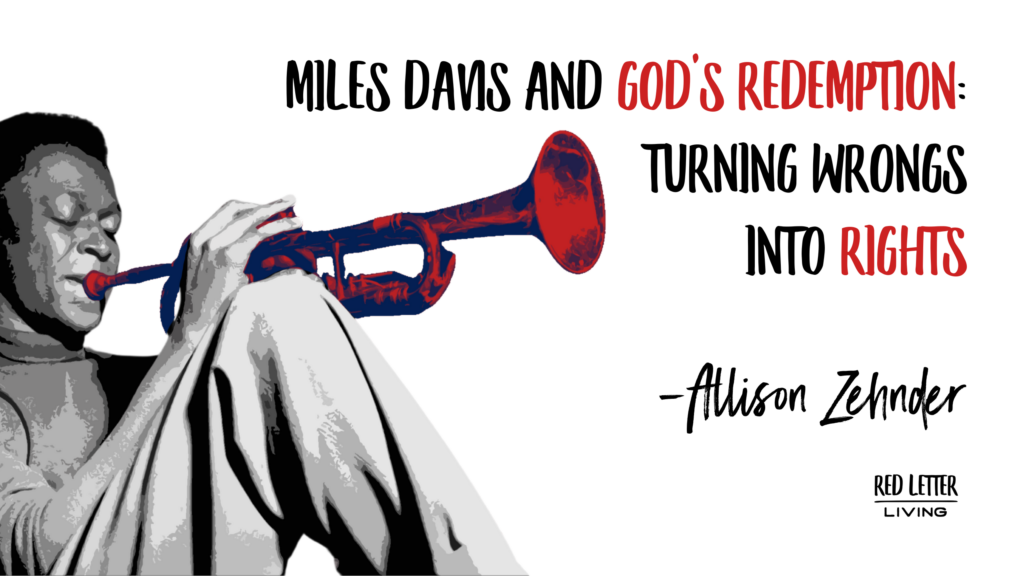

In November 2011, the United Nations Educational, Scientific and Cultural Organization (UNESCO) officially designated April 30 as International Jazz Day. What made jazz popular was its ability to break out of traditional “music rules” and use unexpected notes or elements in its structure.
Famous musician Miles Davis was called a ‘one-take’ musician. He would intentionally not give his band members the songs they would perform until the day. He wanted their performance to be spontaneous and have intentional mistakes. He loved live-sounding music that had an unpolished quality to it. Even when recording an album, unlike other musicians who worked to try to make it sound perfect, he wanted it to sound rough around the edges. He was ok with mistakes.
Because jazz music allows mistakes, famous jazz musicians had recovery strategies to use when things went inevitably off track and all required repetition. In jazz music, repetition gives the audience a sense of security or emphasizes a moment or line. Repetition was the safety net that allowed artists the freedom to try new things.
1) They could repeat the phrase and emphasize the mistake.
2) They could repeat the phrase with the correct notes.
3) They could turn the mistake into a cycled pattern and resolve it.
Listen to Kind of Blue, the best-selling jazz record by Miles Davis. What repetition can you hear? Can you catch any “fixed mistakes”?
Mistakes and off-beat sounds in jazz are balanced with gentle, rhythmic, and smooth sounds like a single instrument playing the same notes. This is called repetition. In the Bible, you will often see the same message repeated to emphasize something or to give the reader a sense of security. If the author has something very important to say, they will often write it more than once.
There is repetition all over the Bible. For example, Genesis 1 and 2 repeat the story of God creating the world. The Ten Commandments are written twice, in Exodus 20 and Deuteronomy 5. You will also find repetition in the Psalms, which are poetry. Look up Psalm 136. How many times is the phrase ‘His love endures forever’ repeated? *see bottom for the answer
The last book found in the Old Testament is Malachi. While Malachi is only 55 verses, it has much to tell us about God’s plan for the Israelites and His plan for you. Malachi uses repetition to emphasize the most important parts. A repeated message helps you discover what is most important.
Read Malachi 1:10-14 below.
10 Oh that there were one among you who would shut the doors, that you might not kindle fire on my altar in vain! I have no pleasure in you, says the Lord of hosts, and I will not accept an offering from your hand. 11 For from the rising of the sun to its setting my name will be great among the nations, and in every place incense will be offered to my name, and a pure offering. For my name will be great among the nations, says the Lord of hosts. 12 But you profane it when you say that the Lord’s table is polluted, and its fruit, that is, its food may be despised. 13 But you say, ‘What a weariness this is,’ and you snort at it, says the Lord of hosts. You bring what has been taken by violence or is lame or sick, and this you bring as your offering! Shall I accept that from your hand? says the Lord. 14 Cursed be the cheat who has a male in his flock, and vows it, and yet sacrifices to the Lord what is blemished. For I am a great King, says the Lord of hosts, and my name will be feared among the nations. Malachi 1:10-14
In this passage, God is unhappy that the people do not respect Him with their offerings. The people were bringing lame, sick, and stolen animals for the offering even though God told them it had to be an unblemished male animal that was healthy. God was frustrated with their second-rate offering and their poor attitudes. Some of these words seem harsh. God doesn’t leave us guessing when we are missing the mark.
But even as He offers correction, He has another message for the people. Reread the scripture. What phrase or words are repeated three times?
The phrase repeated three times is ‘My name will be great among the nations.’
At first, this can seem like a strange thing to say. Why is God repeating that over and over? What do other nations have to do with the sacrifices that the Israelites bring? What message is God getting across to the Israelites?
God shares His main purpose for all He does with and through the Israelites. From the beginning of their nation, when God told Abraham he would have many descendants and his family would be great (the Israelites), it was never just about them. It was always about all nations. Read what God promised Abram:
The Lord said to Abram, “Go from your country, your people, and your father’s family. Go to the land I will show you.
“I will make you into a great nation,
and I will bless you;
I will make your name great,
and you will be a blessing.
I will bless those who bless you,
and whoever curses you I will curse;
and all peoples on earth
will be blessed through you.”
God wanted the Israelites to be a nation that would bring God’s love and salvation to the rest of the world. He planned to save the whole world through them. That message was started in Genesis, continued in Malachi, and still stands true today. It never changed, no matter what happens.
God repeated the phrase, ‘My name will be great among the nations’ for a reason. He didn’t want the Israelites to be separated from others and only care about themselves at the expense of others. God wanted His people to be a part of making His name known, making him great to ALL NATIONS so that He could bless and help them.
Other nations believed their offerings were made to earn favor. They had to keep their gods happy, so they offered many sacrifices. The Israelites’ sacrifices weren’t about making Him happy or appeasing Him. They were about getting close to Him.
God wanted to dwell with His people, but to love all people of the world, he had to deal with their sins. God could remove their sin through the right sacrifices and live with them. God knew that the animals would not be enough. Those sacrifices were only signposts pointing forward to the ultimate sacrifice.
Jesus would be born 300 years later. He would serve the world, bringing His message through the Israelites that He offered all people salvation. In Malachi, the sacrifices weren’t to separate them from other people but to bring them close to others.
In an article in Open Culture, musician Herbie Hancock describes what it was like to work with Miles Davis. While playing with David, Hancock hit a very obvious wrong cord. “Miles paused for a second,” he says, “and then he played some notes that made my chord right… Miles was able to turn something that was wrong into something that was right.”
“What I realize now is that Miles didn’t hear it as a mistake. He heard it as something that happened. As an event. And so that was part of the reality of what was happening at that moment. And he dealt with it…. Since he didn’t hear it as a mistake, he thought it was his responsibility to find something that fit.”
Let’s be clear: God sees our sin as sin. This isn’t Bob Ross calling mistakes “happy accidents.” There is nothing cute or happy about our sin. Sin separates us from God, and He can no longer be around us. God was direct to the Israelites and us about our sins, but He didn’t leave us to fix our problems. As Miles Davis did for Herbie Hancock, God corrected our mistakes. Jesus took your sin on the cross and died in your place. He rose and defeated death once and for all so you can, like God said, make His name great in all the nations.
Mistakes will happen in jazz; mistakes will also happen in life. Approaching our trials the way Miles Davis approached mistakes in jazz music will give you the boldness to hand your sins to God. God doesn’t give up on his plan. Over and over, through a constant cycle of faithfulness, He gives humanity the opportunity to serve Him and then be rescued by Him when they fail. The repeated message of the cross is new every morning.
Miles Davis said, “My future starts when I wake up every morning. Every day I find something creative to do with my life.”
You have an opportunity every day to create a joyful noise in honor of your Lord, mistakes and all!
“There’s no such thing as mistakes, only opportunities.” – Miles Davis
Turn your mistakes into opportunities to share the goodness of God’s redemption plan in your life. One of the challenges in Red Letter Challenge is to record your story and share it with others. It is a way to take your story and go to all nations, just as God always planned for you.
If you are not ready for that, simply write your story down. Putting words down on paper helps prepare you for when you can share your story.
*The phrase ‘his love endures forever’ is repeated 26 times in Psalm 13
